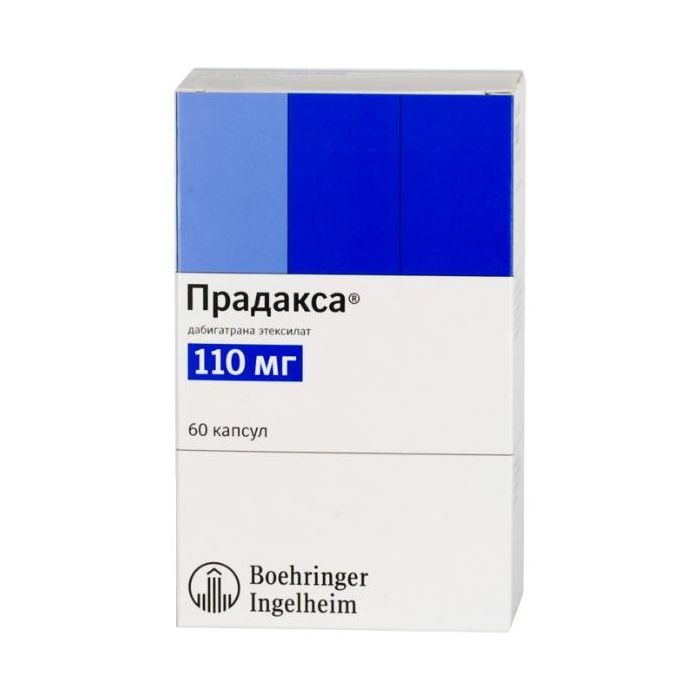Dabyhatrana eteksylat | Pradax capsules 110 mg, 60 pcs.
Special Price
$116
Regular Price
$133
In stock
SKU
BID466325
Release form
Capsules.
Packaging
60 pcs
Special instructions
Risk of developing hemorrhages: Unfractionated heparin can be used to maintain the functioning of a central venous or arterial catheter.
Should not be used simultaneously with PRADAXAВ®:
unfractionated heparins or its derivatives, low molecular weight heparins, fondaparinux sodium, desirudin, thrombolytic agents, GPIIb / IIIa receptor antagonists, clopidogrel, ticlopidine, dextran K. and sulfintraz
The combined use of PRADAXВ® in the doses recommended for the treatment of deep vein thrombosis and doses of acetylsalicylic acid in doses of 75-320 mg increases the risk of bleeding. There is no evidence of an increased risk of bleeding associated with dabigatran when taking PRADAXВ® in the recommended dose for patients receiving small doses of acetylsalicylic acid in order to prevent cardiovascular diseases. However, the available information is limited, therefore, with the combined use of low dose acetylsalicylic acid and PRADAXAВ®, it is necessary to monitor the condition of patients with the goal of
timely diagnosis of bleeding.
Careful monitoring (for symptoms of bleeding or anemia) should be carried out in cases in which an increased risk of hemorrhagic complications is possible: - A recent biopsy or trauma.
- The use of drugs that increase the risk of hemorrhagic complications. The combination of PRADAXAВ® with drugs that affect hemostasis or coagulation processes.
- Bacterial endocarditis
Short-term administration of NSAIDs when used together with PRADAXAВ® for analgesia after surgery does not increase the risk of bleeding. Limited data are available on the systematic administration of NSAIDs with a half-life of less than 12 hours in combination with PRADAXAВ®, there is no evidence of an increased risk of bleeding.
Renal failure: pharmacokinetic studies have shown that in patients with decreased renal function, including age-related, an increase in the effectiveness of the drug was noted.
In patients with moderately reduced renal function (creatinine clearance of 50-30 ml / min), it is recommended to reduce the daily dose to 150 mg per day. PRADAXAВ® is contraindicated in patients with severe impairment of renal function (creatinine clearance Spinal anesthesia / Epidural anesthesia / Lumbar puncture: In the case of traumatic or repeated spinal puncture and prolonged use of an epidural catheter, the risk of developing cerebrospinal bleeding or epidural hematoma should not be taken. earlier than 2 hours after removal of the catheter, such patients should be monitored for possible detection of neurological symptoms. p The effect on the ability to drive mechanisms
The effects of dabigatran etexilate on the ability to drive vehicles and control mechanisms have not been studied.
Composition
Active substance:
dabigatran etexilate mesylate
Excipients:
acacia gum
tartaric acid coarse
tartaric acid powder
tartaric acid crystalline
hypromellose
dimethicone
talc
giproloza (hydroxypropyl)
Sheath:
capsule of hypromellose (HPMC ) with an overprint in black ink (Colorcon S-1-27797)
HPMC capsules:
carrageenan potassium chloride titanium dioxide indigo carmine (E132) dye sunset yellow (E110) hypromellose (hydroxypropylmeth cellulose), purified water
Composition of black ink Colorcon S-1-27797, (%, mass.):
shellac 52.500%, butanol 6.550%, purified water 1.940%, ethanol denatured (methylated alcohol) 0.650%, iron dye black oxide (E172) 33.770%, isopropanol 3.340%, propylene glycol 1.250%
Dosage and administration
Capsules should be taken orally, 1 or 2 times a day, regardless of the time of food intake, washed down with water. Do not open the capsule.
Side effects
Disorders from the hematopoietic and lymphatic systems: anemia, thrombocytopenia.
Immune system disorders: hypersensitivity reactions, including urticaria, rash and itching, bronchospasm.
Disorders of the nervous system: intracranial bleeding.
Vascular disorders: hematoma, bleeding.
Disorders of the respiratory system, chest and mediastinum: nosebleeds, hemoptysis.
Gastrointestinal disorders: gastrointestinal bleeding, rectal bleeding, hemorrhoidal bleeding, abdominal pain, diarrhea, dyspepsia, nausea, ulceration of the gastrointestinal mucosa, gastroesophagitis, gastroesophageal reflux disease, vomiting, dysphagia.
Disorders from the hepatobiliary system: increased activity of "hepatic" transaminases, impaired liver function, hyperbilirubinemia.
Changes in the skin and subcutaneous tissue: skin hemorrhagic syndrome.
Musculoskeletal disorders, disorders of the connective tissue and bones: hemarthrosis.
Changes in the kidneys and urinary tract: urogenital bleeding, hematuria.
General disorders and changes in the injection site: bleeding from the injection site, bleeding from the injection site of the catheter.
Damage, toxicity and complications from procedures: post-traumatic hematoma, bleeding from the site of surgical access.
Vascular disorders: bleeding from an operating wound.
General disorders and disorders at the injection site: spotting.
Damage, toxicity and complications of postoperative treatment: hematoma after wound treatment, bleeding after wound treatment, anemia in the postoperative period, discharge from the wound after procedures, secretion from the wound.
Surgical and therapeutic procedures: wound drainage, drainage after wound treatment.
Overdose
Overdose with the use of the drug PRADAX may be accompanied by hemorrhagic complications, which is due to the pharmacodynamic features of the drug. When bleeding occurs, the drug is discontinued. Symptomatic treatment is shown. There is no specific antidote.
Given the main route of excretion of dabigatran (kidneys), recomblows to ensure adequate diuresis. Surgical hemostasis and filling of the volume of circulating blood (BCC) are performed. The use of fresh whole blood or transfusion of fresh frozen plasma is possible. Because dabigatran has a low ability to bind to plasma proteins, the drug may be excreted in hemodialysis, however, clinical experience with dialysis in these situations is limited (see Pharmacokinetics).
When overdosing on PRADAX, concentrates of activated prothrombin complex or recombinant factor VIIa or concentrates of factor II, IX or X may be used. There is experimental evidence to support the effectiveness of these agents in counteracting the anticoagulant effect of dabigatran, however, no specific clinical studies have been conducted.
In the case of the development of thrombocytopenia, or with the use of long-acting anti-aggregates, the question of the use of platelet mass may be considered.
Storage conditions
Store in a dry place, at a temperature not exceeding 25 C.
Shelf life
3 years.
The active substance
Dabigatran etexilate
capsule dosage form
Prescribing
Prescribing
Adults as prescribed by a doctor
Beringer Ingelyhaym, Austria
Submit your review to Earn 10 Reward Points click here to login
Write Your Own Review

